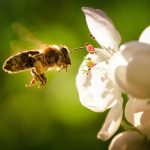EPA allows continued “emergency” use of bee-killing insecticide on Florida citrus
 (NaturalHealth365) The delicate balance of our local and world ecosystems has never been more threatened than in the last 50 years. We, as a society, continue to allow highly toxic substances to be used in just about every facet of life. And, the current (unhealthy) food production model used to feed so many people with insecticides is among the worst offenders.
(NaturalHealth365) The delicate balance of our local and world ecosystems has never been more threatened than in the last 50 years. We, as a society, continue to allow highly toxic substances to be used in just about every facet of life. And, the current (unhealthy) food production model used to feed so many people with insecticides is among the worst offenders.
For example, neonicotinoid products are exceptionally effective at controlling pests but are also the most damaging to almost all pollinators, particularly bees. Although the European Union (EU) has completely outlawed neonicotinoid insecticides and banned the import of nonacid-sprayed produce, the EPA continues to allow emergency use of one in particular: clothianidin.
The emergency use protocol exists because the Environmental Protections Agency (EPA) has banned neonicotinoid nationwide. However, due to the prevalence of a particular insect that causes greening in citrus plants in Florida, the EPA has repeatedly allowed emergency use of clothianidin. Let’s look at why that’s bad, why the product itself is harmful, and what we can do to finally ban this toxin in the U.S. 100% of the time.
Insecticides are almost universally harmful
Our massive interconnected food production system allows us to reduce famine better than at any other time in human history, which is a plus. However, the widespread use of herbicides and pesticides, largely unchecked until the 1990s, has had severe consequences. Measuring the extent of species extinction and human health issues caused by these largely untested chemicals is challenging.
Unfortunately, herbicides and pesticides once hailed as saviors of agriculture, have proven to be quite dangerous. They have been linked to cancer, harming wildlife, and contaminating water sources downstream.
Scientists have recognized the dangers, and regulators around the world have banned many classes of these chemicals, as they are known to cause cancer in mammals, harm birds, and small animals, and devastate insect populations, even those not targeted.
For instance, neonicotinoid has been identified as a major contributor to colony collapse disorder (CCD) in the 1980s and 1990s. CCD is a phenomenon in which most worker bees in a colony disappear, leaving behind a queen, plenty of food, and a few nurse bees to care for the remaining immature bees. This highlights the unnecessary risks posed by pesticides in our food production system.
EPA disregards environmental and human health concerns
In general, pesticides attack the central nervous systems of the affected insects, causing death, usually via paralysis. The reason that neonicotinoid insecticides are so bad is that they very readily disseminate into all the tissues of the plant, not just the trunk or the leaves. Some herbicides will not affect flowers, pollen, or nectar because they are placed to kill invasive beetles or grubs.
When neonicotinoid insecticides are present in pollen or nectar, however, they rapidly affect pollinators who would otherwise not bite the bark or the leaves and would likely not suffer from other herbicide use. Obviously, this does not just affect bees – these poisons also decimate various species of butterflies and moths.
Understanding this, the EPA and most of the rest of the world have banned these toxins. However, due to the intense lobbying of the Florida citrus commissions, the EPA grants the use of clothianidin to fight against the Asian citrus psyllid, the insect we mentioned earlier that causes citrus greening. Through lobbying pressures by environmental groups, these emergency allowances are no longer than two years at a time. Still, it doesn’t seem to matter when the emergency use gets re-approved every 2 years.
What can be done about keeping neonicotinoid banned for good?
Unfortunately, this is not a subject on which you can easily “vote with your wallet.” Florida citrus is pretty ubiquitous, and you can avoid it if you inform yourself, but a widespread boycott of Florida citrus is not likely to be fruitful, pun intended.
Lobbying is likely to have a much more profound effect in this case. Studies have shown that grassroots public campaigning or lobbying through environmental groups has merit and may sway the government to do the right thing.
For example, participating in local environmental projects that gather signatures and present them to elected officials can raise awareness about these issues. Writing to your Congressional representative, starting your own signature campaign, or joining a larger movement can bring these problems to the legislative floor. Additionally, such actions can prompt your representatives to address these concerns directly with the EPA.
If you live in Florida or other areas where these neonicotinoid insecticides are emergency approved, there are bound to be groups near you that you can contact who are fighting against the EPA emergency use policy.
At the end of the day, the best thing you can do is get involved in petitioning the EPA to end these emergency allowances. Studies indicate that the EPA does listen, and public signature campaigns and other means of protest against corporate interests often sway landmark cases. While the world is changing and presenting new problems for pollinators, the least we can do is stop adding to their struggle.
Sources for this article include:



